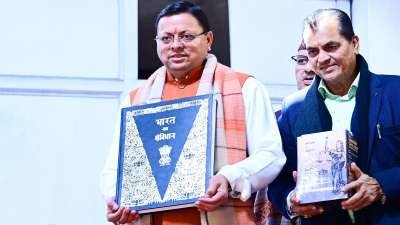
Context
- As reported recently, the Uttarakhand government has put out a contentious measure called the UCC measure, or the Uttarakhand Unlawful Religious Conversion Prohibition Bill.
- This law has attracted national notice and generated a great deal of debate.
- We shall examine the Uttarakhand UCC Bill’s specifics, ramifications, and related debates.
What is the Uttarakhand UCC Bill?
- To control religious conversions in the state, the Uttarakhand Unlawful Religious Conversion Prohibition Bill was created.
- It suggests strict actions to stop conversions that are carried out through fraud, coercion, seduction, or force. Additionally, the bill mandates that anyone wishing to change to a different religion must first obtain approval from the district magistrate.
Implications of the Bill
- The Uttarakhand UCC Bill’s proponents contend that it is imperative to stop fake conversions and shield vulnerable people from being forced to convert to a different religion.
- They think the bill will protect religious freedom and stop people from using their religious feelings as an excuse to convert people illegally.
- However, opponents of the measure express worries about possible abuse and violations of basic rights including the freedom of expression and religion.
- They contend that requiring prior authorization before converting could restrict religious expression and add needless red tape for people who want to practice their religion.
Controversies Surrounding the Bill
- Since its introduction, the Uttarakhand UCC Bill has generated intense discussions and controversy.
- The lack of clarity regarding what constitutes “force, coercion, inducement, or fraudulent means” in relation to religious conversions is one of the main areas of disagreement.
- Opponents contend that the bill’s ambiguous wording may allow for arbitrary interpretations and misuse by the government.
- The bill’s provision that people seek authorization from the district magistrate before converting to a different religion is another controversial feature.
- Opponents contend that this clause imposes excessive government intervention in matters of faith and violates people’s right to privacy and autonomy.
- Concerns exist over the possibility that the measure will be abused for social or political ends.
Response from Civil Society and Legal Experts
- Human rights advocates, legal professionals, and civil society organizations have all responded strongly to the Uttarakhand UCC Bill.
- Numerous people have expressed opposition to the measure, citing the necessity to preserve secular ideals contained in the Indian Constitution as well as constitutional issues.
- Legal experts have identified gaps in the bill’s provisions as well as possible inconsistencies with already-enacted legislation and established case law.
- They emphasize how crucial it is to guarantee that any laws intended to control religious conversions uphold fundamental rights and conform to constitutional norms.
FAQs
Q1: What is the UCC Bill for Uttarakhand?
Ans: The proposed law known as the Uttarakhand Unlawful Religious Conversion Prohibition Bill, or UCC Bill, intends to control religious conversions inside the state of Uttarakhand.
Q2: What aspects of the Uttarakhand UCC Bill are most important?
Ans: The law suggests strict actions to stop conversions that are carried out using deception, coercion, seduction, or force. Additionally, people who want to convert to another religion must first get the district magistrate’s approval.
Q3: What is the Uttarakhand UCC Bill intended to accomplish?
Ans: The main goals of the measure are to prevent people from being forced to change their religion and to stop fake conversions.
Q4: What worries have those opposed to the Uttarakhand UCC Bill brought up?
Ans: The bill’s opponents express worries about possible abuse and infringement on basic rights including the freedom of expression and religion. They contend that requiring prior authorization before converting could impede religious expression and add needless red tape.
Q5: What defense does the Uttarakhand UCC Bill’s proponent offer?
Ans: Those who support the law contend that in order to stop dishonest behavior and preserve social harmony, religious conversions must be regulated. They think the bill will make sure that conversions are done willingly and legally and will shield vulnerable people from being taken advantage of.
Q6: How do legal professionals and members of civil society feel about the Uttarakhand UCC Bill?
Ans: Human rights advocates, civil society organizations, and legal professionals have expressed opposition to the law, stressing the need to preserve secular principles and constitutional issues. They emphasize how crucial it is to guarantee that any laws intended to control religious conversions uphold fundamental rights and conform to constitutional norms.
Q7: What is the effect of the Uttarakhand UCC Bill on the state’s religious minorities?
Ans: The bill’s opponents worry that it will disproportionately harm religious minorities and make their surroundings unfriendly. They contend that it might be used to target people and groups involved in lawful religious endeavors and jeopardize the freedom of religious minority to follow their faith.
Q8 : What is the likelihood of the Uttarakhand UCC Bill becoming law?
Ans: A number of variables, such as court review, public opinion, and political dynamics, will determine the outcome of the Uttarakhand UCC Bill. The democratic process and the decisions made by policymakers will ultimately determine whether it becomes a law, despite possible opposition and legal challenges.
Can you be more specific about the content of your article? After reading it, I still have some doubts. Hope you can help me.